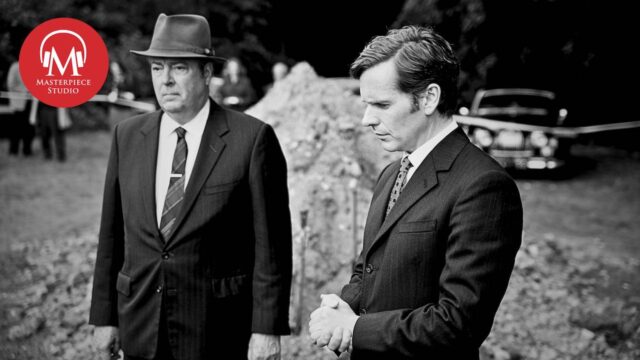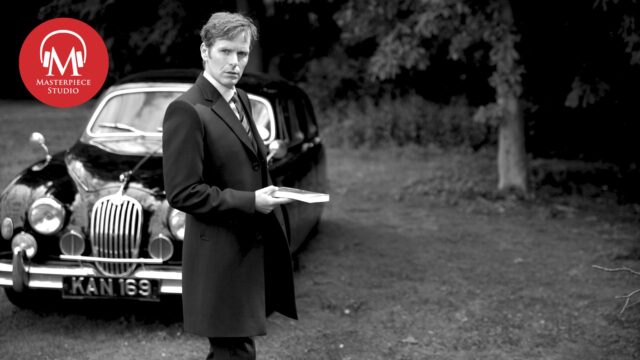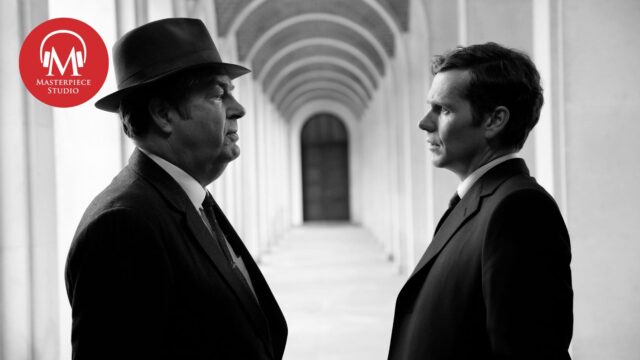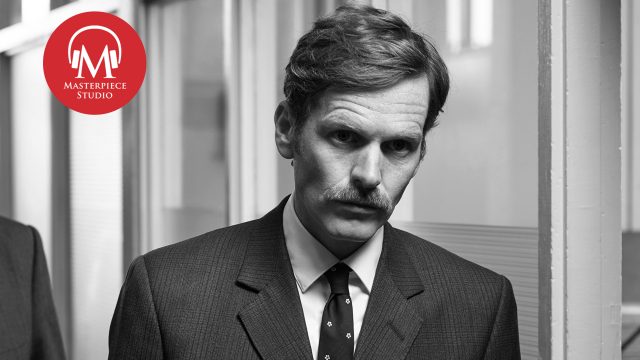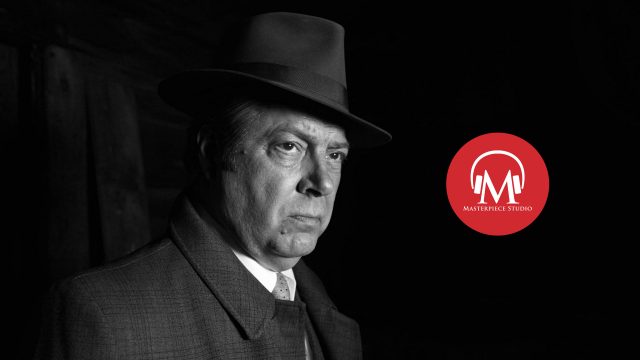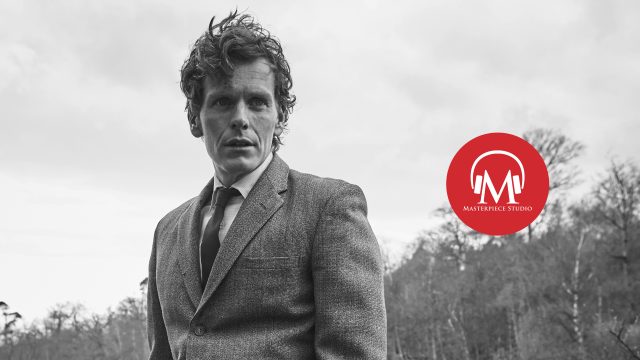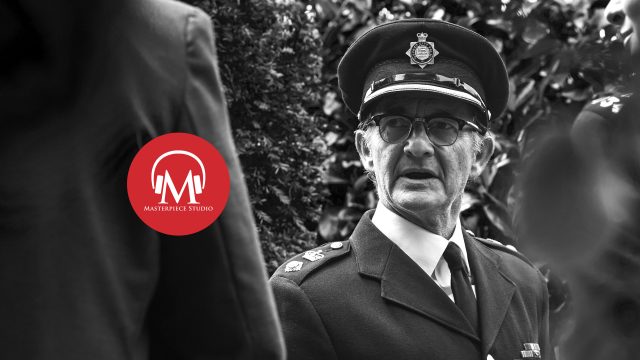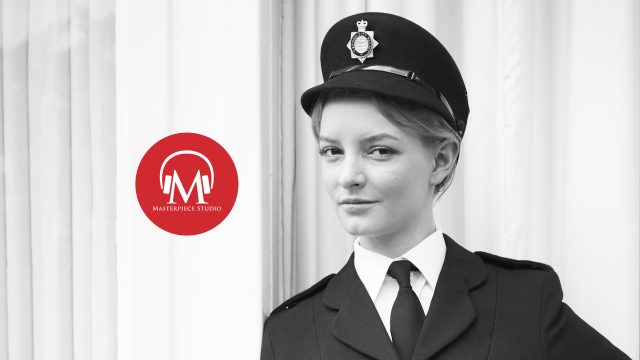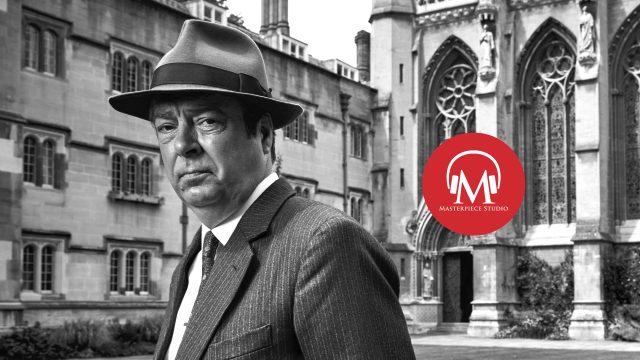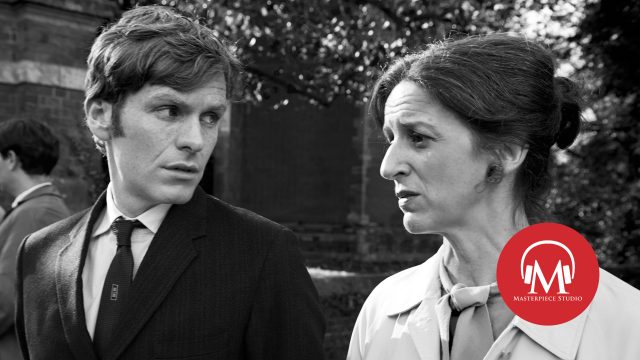A string of mysterious and seemingly unconnected Oxford murders greets Detective Constable Endeavour Morse in a brand new season of Endeavour. Lead series writer Russell Lewis wakes up every day wondering, “Who am I going to kill today?’ — and he tells us what, and who, to watch for in the upcoming fourth season.
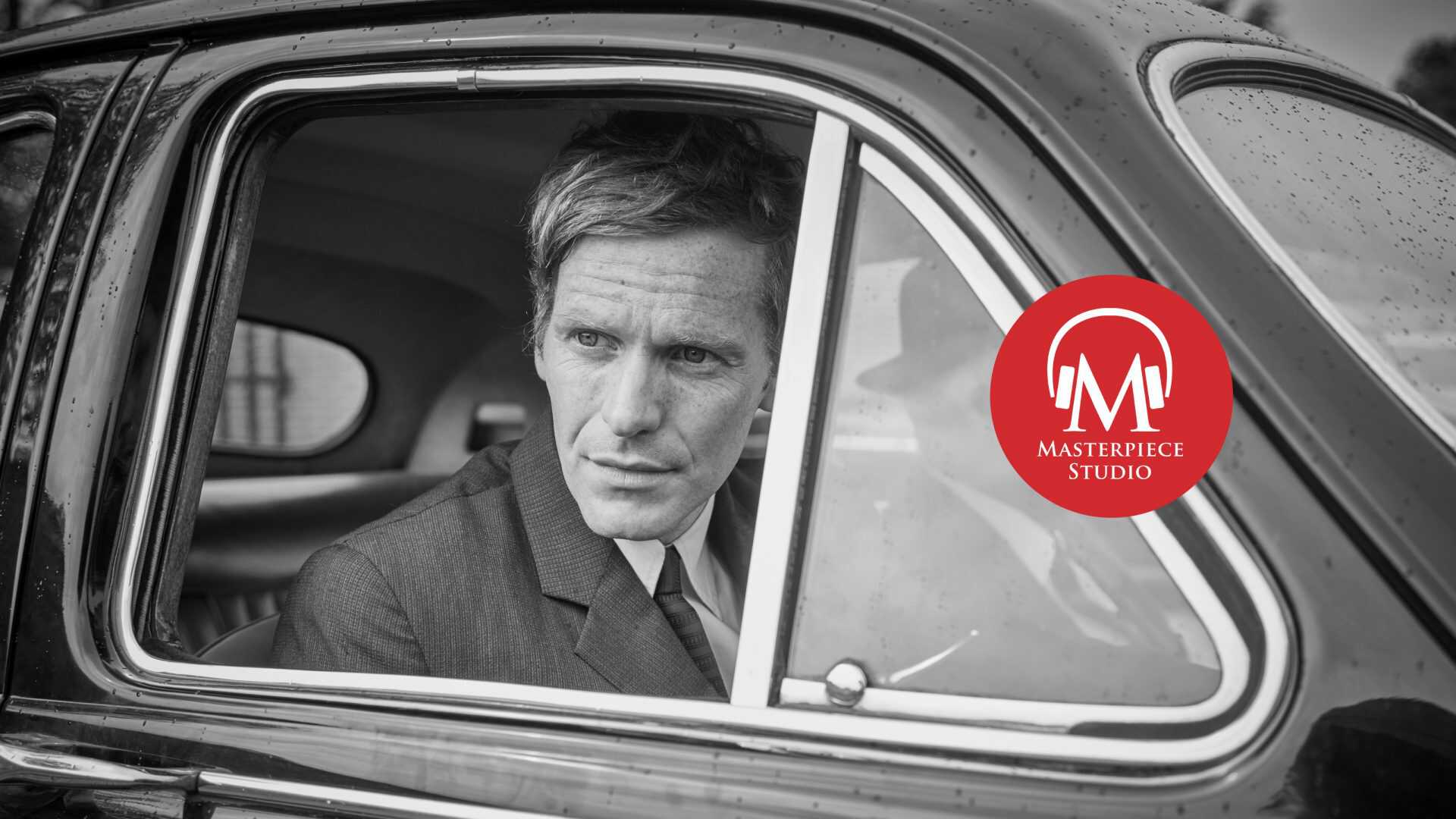

‘Endeavour’ Writer Russell Lewis Already Knows Who Dies Next
Released --:--
Related to: Endeavour, Season 4
Download and subscribe on: iTunes | Spotify| RadioPublic
Transcript
MASTERPIECE Studio is brought to you by Viking Cruises. See the world differently by exploring differently. Learn more at vrc.com.
Jace Lacob: I’m Jace Lacob, and you’re listening to MASTERPIECE Studio.
Inspector Lewis. Inspector Morse, and Endeavour. Writer Russell Lewis has written for all three televised iterations of Colin Dexter’s beloved Oxford-set mysteries and has penned every episode of prequel series Endeavour, which began its fourth season this week.
CLIP:
Tessa: The old lady who died there yesterday. Used to work for a doctor’s family out by Binsey….You show me yours. Was it murder?
Morse: We’re treating it as a suspicious death.
Jace: Detective Constable Endeavour Morse is on the hunt this season, for both the missing Joan Thursday and for his own waylaid Sergeant’s exam papers…
CLIP:
Morse: How many…papers…went astray? You said a number. If there were any way to find out, I’d be interested to know!
While Morse searches for professional advancement, he and Detective Inspector Thursday have more than their share of tricky mysteries to crack in the city of dreaming spires.
Thirty years after the launch of the original Inspector Morse series, we spoke to Endeavour head writer Russell Lewis on how the character has changed, what’s stayed the same, and how he keeps these new mysteries fresh after having written so many.
And this week we are joined by Endeavour writer Russell Lewis. Welcome.
Russell Lewis: Thank you very much. Pleasure to be with you.
Jace: 2017 marks the 30th anniversary of Morse launching on television. Why do you think the character of Endeavour Morse continues to endure?
Russell: On television I think, people’s affection for him was established very heavily between 87 and in 2000. And his character people took him to their hearts really — his vulnerability his melancholy. I think there’s something of that that we can all relate to. Essentially he’s a decent man. You know, that goes the distance often at great costs to himself, to deliver justice. And I think that that’s kind of universal hero, really.
Jace: Endeavour was originally a one-off intended to commemorate the 25th anniversary of Morse. What was the original brief from Mammoth?
Russell: I’d been working on Lewis for them and we’d done a couple of happy years together on that and they just said, ‘Do you think we could we could look at young Morse? How would you go about it, where would you start?’ for the anniversary and that was the jumping off point. Colin had written a short story for newspapers in which, I think it was set in 68 it may have been 68 or 69, but with Morse still at university. And I think for us as we were celebrating the television incarnation it made more sense for us to stick more closely to John Thaw’s date of birth which gave us a bit of wriggle room and allowed us to go back further into the 60s with him as a police officer. So we were able to jump off in 1965 with him already a young detective constable rather than follow Colin’s timeline which would have had which was you know more closely aligned with his novels that would have had him still at university in 68. So we we had a little bit of creative wriggle room there which Colin, you know, gave his blessing on. He was always very practical, Colin.
Jace: Morse devotees were gutted to learn of the death of Colin Dexter in March of this year. Beyond the character of Morse himself, just how keenly felt his Colin’s legacy in Endeavour?
Russell: Colin’s loss is immeasurable to all of us. He was our true north and we miss him a lot. And we all know that none of us would be doing what we do if he hadn’t had a very wet holiday in Wales in the 70s. So he’s still there for us he’s still there for us on screen. With the permission of his family you’ll still be able to find Colin. You’ll just have to look a little bit harder than usual.
Jace: Well he does pop up in the fourth season he’s in a portrait in ‘Game’ and uh, spoiler alert he’s in a newspaper photo in next week’s ‘Canticle’ will you can continue that tradition moving forward into the fifth series?
Russell: We will yeah, always.
Jace: Colin consulted on Endeavour. What was his involvement like on the show and what sort of suggestions or comments would he make regarding the scripts or plot?
Russell: Colin was across much of the single and then probably most heavily across the first two or three series. But I think because the longer we worked together. I think he was he was reassured that we weren’t going to do anything sacrilegious with with his character and very gently sort of let us run with it. You know, without without too, too heavy a hand on my shoulder. He was never proprietary but he, you know, the interesting thing about Colin was, I certainly remember on our on ‘Girl’ I think that I’d gone to a great deal of trouble. I’d gone to a great deal of trouble to have a character’s name that I was able to reveal in a certain way. But then, but Colin kind of cut that in half and said you know ‘This is just too complicated. You’re working too hard.’ So that was that was invaluable for us and we simplified it and that was that was often his cri du coeur, really which was just, ‘Don’t make it too complicated,’ weirdly enough. When you look at the novels and how fiendishly devised they are. It was an interesting note to get from him.
Jace: Fittingly, you had a conversation with Colin Dexter at the Morse bar at the Randolph Hotel in Oxford to discuss the notion of ‘Endeavour’ as a prequel series. What was his initial reaction to the idea of doing a prequel?
Russell: To the initial idea, he wasn’t averse but he was very much wanting to see the script, what it looked like on paper. So we did a very very detailed treatment and then took it to script which we did team drafts of I think trying to get it just so before we brought it to Colin. And then went up and met with Colin in the Randolph and it was an interesting evening because Al McCullin who wrote on ‘Inspector Morse’ had a play at the New which was a Morse play, with somebody else playing Morse and Lewis. And we ended up going to see that with Colin and also with us, ‘Lewis’ was shooting out of Oxford at the time. And so I sat there with Colin on one side and Kevin on the other, watching other versions of Lewis up on stage with with with them beside me. It was it was surreal but by that point by the time we went to the theatre Colin had already given us his blessing on Endeavour and away we went.
Jace: Was he involved in the process of casting. What did he think of Shaun Evans as the young Endeavour.
Russell: He was delighted with Shaun. He was delighted with Shaun, and they became very firm firm friends very quickly I think. Um, Colin was was terrific with Shaun and Shaun was as all of us was ever in awe of Colin so that was, it was lovely to see. It was the last time I saw them, last time I saw Colin we did up a panel at Blenheim, weirdly and Blenheim was where my Inspector Morse adaptation of Colin’s novel ‘The Way Through the Woods’ was set. So it was very strange that the journey that began for me when was it now, 96 I think? 95, 96 at Blenheim with Colin, then ended some years later at the same place with him and my last sighting of Colin he was being helped back to his car by Shaun and then resting upon his arm and I found that then and do now somehow just.
Jace: The very first episode of Endeavour has some beautiful touches that really paint it as a love letter to Morse. There’s a look in the rearview mirror for one, Abigail Thaw’s line, ‘Have we met before?’ is another. What with what was the inspiration behind those rather deft hommages?
Russell: When Morse came along it was a game changer for certainly British television drama. That, two hour single sitting adventure. And you know John was right at the heart of that. So the moment in the rearview mirror we didn’t we hadn’t wanted to overegg it from the beginning as a kind of hagiography but we certainly wanted to acknowledge and pay respect to exactly why it was we were doing what we were doing and that seemed to be the most elegant way of doing it for us. And then we were able to get Abigail involved and again you know it was there for those that knew her relationship to John for. But for those that didn’t, the scene also worked on its own merits so that was our approach to it.
Jace: You, you mentioned that that you not only worked with John Thaw on Morse but also on ‘Kavanagh QC’ and ‘Monsigneur Renard.’ What was your relationship like and what, what is your fondest memory of John?
Russell: Certainly in terms of doing ‘The Way Through the Woods’ with him with Morse was going up and watching him shoot the last scene of that where he quotes, where he’s talking about Kipling and if you can be the triumph in disaster and that was shot in Leith Hill it wasn’t actually it wasn’t actually shot in Whiton Woods. It was one of our scandalous television cheats, we filmed it in a completely different location — because I came to Morse as a fan. I was a fan for many years before I you know I got involved with it and just being there and watching John and Kevin and James Grout working in that final washup moment at the end of it that was you know for a young scribbler that was pretty high cotton and he was you know John was always gracious and charming about the work and I the final one was on was on Monsigneur Renard when the first time I saw him in his robes he’d had a haircut, a rather special haircut and he reminded me of Spencer Tracy and I told him I could have said anything that could have made him happier because he was a great admirer of Spencer Tracy. So was that was a happy memory.
Jace: Unless this changes in the fifth season, you’ve written every single Endeavour film thus far. Is that by design, and how challenging is it to approach each new scripts with that level of freshness?
Russell: Yes, I mean it is a it’s always a challenge but it’s one we relish when one Team Endeavour kind of relishes because it’s not just me you know I work very closely with all the Mammoths and with Sean and Rog and so you’re not entirely alone. Usually I’ll come in with a number of ideas pre-loaded things that arise usually from the year that we’re in. So there’ll be some little historical fact that one will extrapolate a story from things that one can smash together to create you know fusion if you will and give us a new story. So that’s that’s that’s usually how we begin. And always it’s about Endeavour’s journey to greatness, I suppose. How did he become the detective that everybody first fell in love with in his middle years? So we’ve got a wonderful blank canvas to fill in.
Jace: ‘Endeavour’ blends together mystery puzzles with incisive character beats. Which element comes first when you’re devising a plot for an episode, or are those somehow inseparable?
Russell: What comes first the lyrics or the music? It’s. Sometimes one sometimes the other that’s that probably sounds a copout answer and a bit glib. With us, our prime directive is to provide entertaining murder mysteries week by week that are self-contained. So for all our character arcs and little little mini crime strands running through, we’re always looking to provide a good solid ‘Whodunit?’ each week. But to come out of a slightly different trap every time we do.
Jace: Morse brought us the Oxford of the 80s and 90s. Lewis The Oxford of the augts and teens and Endeavour the Oxford of the 1960s, in fact exactly 50 years ago. What does the time period bring to the show and its inherent tensions?
Russell: For us, when we started we always felt that certainly my recollection of the 60s was the first half of it still had one foot in the middle of the 1950s. And from there it’s a step to 45. I remember the bombsites growing up. There was still a kind of a hangover really from from the 40s and 50s through to the early 60s and I think that’s certainly true when you look at TV and movies of the period. Slightly English pea-souper mentality about things. But then you know, mid-60s it all starts to, to kick off.
Jace: So many showrunners will say that the setting of a show is the character of its own to the point that that statement has become cliché. But what role do you feel that Oxford itself has played in these series success?
Russell: Well. I think as Morse said once, “It’s very pretty.” You know, it has an immediate natural charm it’s not as if we had to build the most gorgeous set imaginable. It was all just there for us and has been there for for Morse. And then Lewis from the 80s. Um, I think it travels well I think that’s one of the reasons it travels well. But the other thing about Oxford is as you’ll know is it’s timeless. So it helps us enormously because certainly with some of the sleight of hand and trickery that we’re able to use much of sixties Oxford is unchanged to today. You know, there are certain streets, you know parking meters and double yellow lines notwithstanding which we can digitally remove, that people would have recognized in 65, 66, 67, and onwards. So it’s for us it’s enormously helpful. We don’t have to. It’s the one part of the country that we don’t have to redress too much to get it back to its period look
MASTERPIECE Studio is brought to you by Farmers Insurance and their eighty-eight years of experience helping people so that they can prepare for the unexpected. They know a thing or two because they’ve seen a thing or two. Find an experienced agent at farmers.com.
MASTERPIECE Studio is also brought to you by Viking Cruises, //exploring the world in comfort. Learn more at vrc.com
Jace: Your scripts are often full of literary cinematic or historical references. Are they intended to be another layer of Endeavour’s puzzle box mystery for viewers to decode?
Russell: Absolutely given that we can’t literally provide a crossword you know to more Endeavour’s obsession with cursive herbalism our little hidden nods and references are just another — because people tell me they come back and watch them for a second and a third and even a fourth time — little things that people might pick up on further down the line. There is a theme usually not always but it usually is as crossword setters will sometimes have a theme to their puzzle of the day. So for us it’s just another layer of fun. I mean they, they are they are the cherry on the cake. The finial on the roof if you wish. Just a bit more fun again pays homage to Colin and Morse’s fondness for puzzles.
Jace: On that note, turning our attention to this week’s episode, ‘Game.’ Morse learns that his sergeant’s exam has disappeared rendering him with an automatic failure.
CLIP:
Thursday: Didn’t have your head in the clouds all the time, you might have gone better with your Sergeant’s. Mr. Bright mentioned.
Morse: Did he mentioned I could have revised till Ragnarok for all the good it would have done me? If my exam paper doesn’t arrive, then it’s an automatic failure.
Jace: Is this just happenstance — papers go missing after all — or are the powerful enemies that Bright mentions actively conspiring against Morse?
Russell: The fun of that, I think, is the not knowing. I think that if we had identified in this opening story who exactly it was was cooking Endeavour’s goose, I think Bright talks about trying to catch smoke. We certainly did in an early draft and I think that that helps us with Endeavour, that you don’t know who it is that’s got it in for you, exactly, and it certainly frees you up as a storyteller to develop that. But yeah know I mean we do know we know ourselves. What lies what lies behind it all. But Endeavour is on the back foot certainly to begin with.
Jace: With the departure of Joan for parts unknown, the Thursdays’ home is now an empty nest. You describe this so simply it so beautifully in the script, and I’m going to read a little snippet here: ‘Win bustles off to the kitchen table cleared. No Sam at his Frosties. None of the usual Thursday hustle and bustle. Endeavour looks to the table by the mirror. A forlorn tube of lipstick. Endeavour. An all too familiar ache. He takes a seat. The clock ticks. At length, footfalls upon the stairs.’ How did you approach writing that moment and giving it the emotional weight it needed to have been in such a short span?
Russell: Well in years of practice I suppose you always split space is a premium. Time is always at a premium so you kind of have to develop a slightly haiku style, or a taut Chandleresque way with your stage directions because it’s not for you to block a scene you know unless there are specific things that you need to achieve physically within that scene so it’s more about imparting a mood to the director to the actors and that on the day seemed to be the happiest way those those words could fall for me.
Jace: There’s a beautiful moment in this episode between Endeavour and Thursday after this the discovery of Tessa Knight’s body in which they reconcile each acknowledging the other’s respective pain. Is this as much as these two can open up to one another?
Russell: Yes again I think it’s it’s generational and it’s also it’s it’s 67 and these are you know English reserve and all — there wasn’t a lot of hugging went on back then. So this is a stiff upper lip. This is this is how we express our profound and deep affection for one another. Well it certainly was then.
CLIP:
Thursday: That poor girl. I should have listened to you.
Morse: Well, you had things on your mind.
Thursday: Who doesn’t? That’s no excuse. This lands at my door. Nobody else’s.
Morse: You couldn’tve known.
Thursday: You knew! You always know. And you were cheated. At your Sergeant’s. I know you wanted it. Deserved it, too.
Jace: How does Joan’s departure from Oxford further test the strength of the bond between Endeavour and Thursday this season?
Russell: It does test it enormously in many and varied ways to say more, I think would would really be to spoil any, any potential surprises for the viewer.
Jace: How important is Joan to the DNA of the show?
Russell: Endeavour and Joan was always a twinkle in my eye from the moment they first shared the screen together. I tried to get the Thursdays I think right into the single that they were the one off. But we hadn’t been able to find room for them and I think I tried to get them in again in film one of season one. And again there was no room for them. And finally we got them on screen in the second film a few for the first time that they met. And for the show, I mean…here’s the thing. Women certainly in ‘Morse’ were often were more often than not guest characters that came in for one story and left. And as much as we are telling our murder mysteries and we’re looking at British social change. I really felt we needed to have strong female characters of a class that I knew and know to tell their story as well because as much as it was change for the place. For many aspects of British life it was also a huge period of change for women in Britain as well. And without getting on a soapbox, it was important to reflect that for me in our stories, you know where we are. I come back again and again to saying we make murder mysteries. But even within that, wherever we have room we are trying to offer some social history as well through the eyes of Win who is of one generation and her daughter, who is of the next generation. I think what’s been fun for us with ‘Endeavour’ and the Thursdays is when he first encounters them they are an ideal. They are the happy family that he never had. And is the second half of the decade is unwinding. So we are watching that fragment for quite natural reasons. But born on a wave of social change. So that was that was where we came from with with Win and with Joan very much.
Jace: Professor George Amery is played by James Lorenzen who appeared 30 years ago when the very first film of ‘The Dead of Jericho.
Russell: He did.
Jace: Are there any callbacks that eagle eyed viewers should go back and look for in this first episode?
Russell: Crikey. I think that I think that that’s the main one there are some others. But you really are going to have to try to dig them out.
Jace: I was waiting for Gemma Jones to show up, as well, but alas.
Russell: All good things to those who wait.
Jace: Ah ah. What should viewers make of that final scene with the tarot card, at the very end of the first episode, and does that narrative strand continue to play out over the course of the season?
Russell: I think is unlikely we’d include that image if we were just going to leave it there. So your viewers will have to stay tuned and see what happens next. There is a method to the madness, and I’d be intrigued to see how quickly people can’t jump to it. And it does lead somewhere.
Jace: The hands that we see will be revealed to be those of Sheila Hancock, John Thaw’s widow. What was behind the idea of the casting of Sheila?
Russell: It was our last story in the run and it was the 30th anniversary and Sheila had never done Morse, As far as I believe she did Cavanaugh, I think but I don’t think she’d done Morse. So it was our opportunity to to narrow the distance between Morse in 87 and us now making our show, albeit set in the 60s and bring those two worlds together.
Jace: You’re currently filming the fifth season of Endeavour right now. What’s next for you after it wraps?
Russell: Postproduction and should people want more of it, we would be starting pretty much straight away. It’s, t’s a full time number, yeah. Particularly as for this fifth series we’re doing now with 50 percent more ‘Endeavour’ we’re doing we’re doing another two films so you’ve got we’re doing six this year, for 1968.
Jace: Oh wow.
Russell: Yeah.
Jace: That will keep you busy.
Russell: It does. Indoor work and no heavy lifting. As I say it’s, a delight. You know it never really feels like work you know. I mean seven days a week you know long days you know. For everybody. But it’s you know you’re back to the wild bunch. Yeah I wouldn’t have it any other way. You know it’s such a privilege to work with brilliant actors, wonderful directors, amazing crew, wonderful cast and working with the Mammoths and ITV. And it’s a delight. So. And you can tell because you know it’s it really. You never get up thinking you know another day on the phone. You know, it’s ‘Who am I going to kill today?’
Jace: Russell Lewis thank you so much.
Russell: Well, thank you, it was an absolute pleasure and delight.
Be sure to stay tuned to MASTERPIECE for the rest of the fiendishly intricate murder mysteries on this season of Endeavour, airing Sundays at 9 PM Eastern.
And remember to subscribe to MASTERPIECE Studio on iTunes, Stitcher, or wherever else you listen to your favorite podcasts, so you’re sure to catch all of our upcoming behind the scenes conversations and interviews.
Coming up next on the podcast, we’re taking a far-off look ahead to a Spring 2018 release from MASTERPIECE: a new adaptation of Louisa May Alcott’s classic novel, “Little Women.” The publication date of the original novel — and international podcast day — is September 30, and we’ll be exploring the legacy of the novel, and look to its upcoming 2018 miniseries on MASTERPIECE.
And we want your input. Record a voice memo using your smart phone, and send it to masterpiece@wgbh.org, completing the following sentence: “Little Women” was important to me because…” That’s masterpiece@wgbh.org. Send your recorded response by September 15, and you might hear it on the next episode of MASTERPIECE Studio!
MASTERPIECE Studio is hosted by me, Jace Lacob and produced by Nick Andersen. Elisheba Ittoop is our editor. Special thanks to Barrett Brountas and Susanne Simpson. The executive producer of MASTERPIECE is Rebecca Eaton.
Sponsors for MASTERPIECE on PBS are Viking Cruises, Farmers Insurance, and The MASTERPIECE Trust.
Endeavour Podcasts 10 More Podcasts
MASTERPIECE Newsletter
Sign up to get the latest news on your favorite dramas and mysteries, as well as exclusive content, video, sweepstakes and more.











